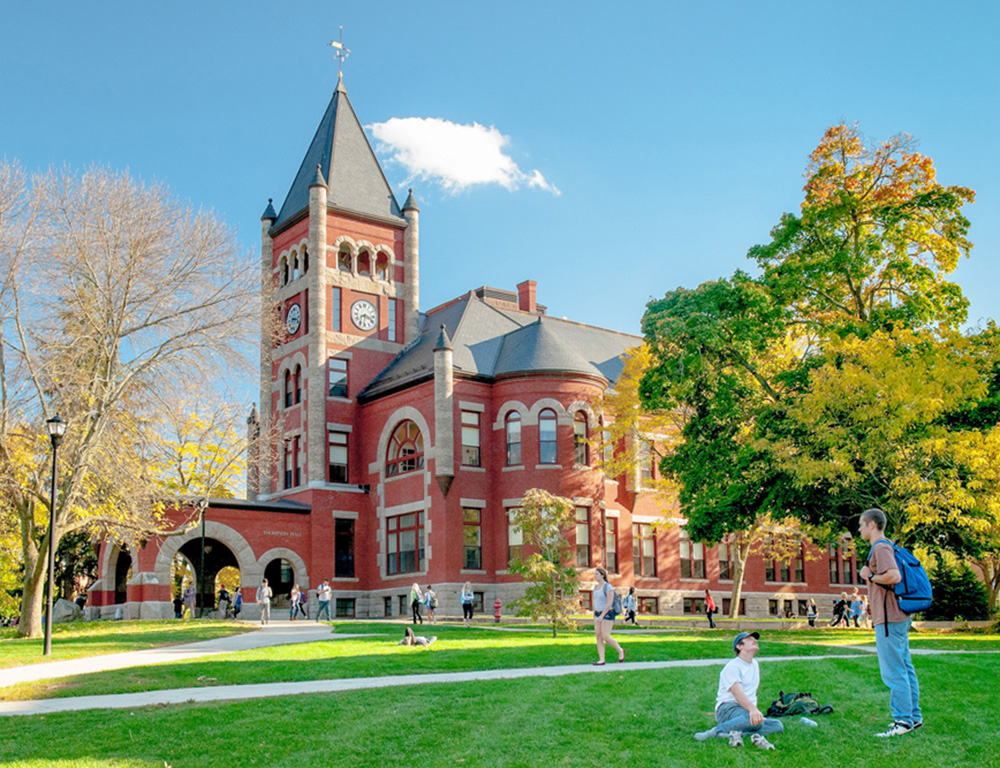-
-
-
-
Per Berglund
PROFESSOR -
Benjamin Chandran
PROFESSOR -
Olof Echt
PROFESSOR EMERITUS -
Francois Foucart
Associate Professor -
Maurik Holtrop
PROFESSOR -
Lynn Kistler
PROFESSOR -
Elena Long
Associate Professor -
David Mattingly
ASSOCIATE PROFESSOR -
Joachim Raeder
Emeritus -
James Ryan
Emeritus -
Nathan Schwadron
PROFESSOR -
Karl Slifer
PROFESSOR -
Roy Torbert
Emeritus -
Jiadong Zang
Professor
B.A. in Physics
Physics Major (B.A.)

What is a Bachelor of Arts in physics?
This degree program is tailored to students who want a broad education, and it’s excellent preparation for middle and high school physics teachers, pre-med and pre-law students, as well as those wishing to pursue a technical career in industry. With fewer required courses than the B.S., students pursing the B.A. have time to explore other academic interests.
Why study physics at UNH?
The program offers introductory physics in a lecture and studio format – an active learning environment that includes group work and labs all in a single room with a professor and graduate teaching assistants. This style allows for a coherent, connected and supportive experience. One studio course integrates the study of calculus and physics, for a deeper understanding of both subjects. You’ll have many opportunities to conduct research with physics faculty and other scientists, working on projects funded by NASA, the National Science Foundation, the Department of Education, Department of Defense, National Institutes of Health and other agencies and organizations. You’ll learn how to approach, analyze and solve complex problems as you develop new technologies, methods and theories that will prepare you for a range of careers in research, engineering and education.
Potential Careers
- Accelerator operator
- Aerospace sciences
- Applied optics
- Engineering research
- Fluids engineering and research
- High school physics teacher
- Materials research
- Physical sciences technician
- Software engineering
- Systems engineering
Contact
DeMeritt Hall 237A
9 Library Way
Durham, NH 03824
Phone: (603) 862-2669
Email: physics.dept@unh.edu
Curriculum & Requirements
This program provides an opportunity for a broad and liberal education, which in some cases may be sufficient for graduate work. This program can also be excellent preparation for middle and high school physics teachers, pre-med and pre-law students, and those wishing to pursue a technical career in industry. Because there are fewer required courses than for a B.S., you have time to pursue other academic interests. A judicious choice of electives may also prepare students for interdisciplinary programs that require proficiency in a specialized area of physics.
Suggested Plan of Study
In the following table, "other required courses" include Discovery courses, writing-intensive courses, language courses required for the B.A., and free-choice electives.
| First Year | ||
|---|---|---|
| Fall | Credits | |
| PHYS 400 | Physics Seminar I | 1 |
| PHYS 407 | General Physics I | 4 |
| MATH 425 | Calculus I | 4 |
| Other Required Courses | 8 | |
| Credits | 17 | |
| Spring | ||
| PHYS 408 | General Physics II | 4 |
| MATH 426 | Calculus II | 4 |
| ENGL 401 | First-Year Writing | 4 |
| CS 410P or IAM 550 | Introduction to Scientific Programming/Python or Introduction to Engineering Computing | 4 |
| Credits | 16 | |
| Second Year | ||
| Fall | ||
| PHYS 505 & PHYS 506 | General Physics III and General Physics III Laboratory | 4 |
| MATH 525 or MATH 527 | Linearity I or Differential Equations with Linear Algebra | 4-6 |
| PHYS 601 | Computational Physics Recitation I | 1 |
| Other Required Courses | 8 | |
| Credits | 17-19 | |
| Spring | ||
| PHYS 615 | Classical Mechanics and Mathematical Physics I | 4 |
| MATH 526 or MATH 528 | Linearity II or Multidimensional Calculus | 4-6 |
| PHYS 602 | Computational Physics Recitation II | 1 |
| Other Required Courses | 8 | |
| Credits | 17-19 | |
| Third Year | ||
| Fall | ||
| PHYS 616 | Classical Mechanics and Mathematical Physics II | 4 |
| PHYS 701 | Quantum Mechanics I | 4 |
| Other Required Courses | 8 | |
| Credits | 16 | |
| Spring | ||
| PHYS 703 | Electricity and Magnetism I | 4 |
| PHYS 605 | Experimental Physics I | 5 |
| Other Required Courses | 8 | |
| Credits | 17 | |
| Fourth Year | ||
| Fall | ||
| PHYS 705 | Experimental Physics II | 4 |
| PHYS 508 | Thermodynamics and Statistical Mechanics | 4 |
| Other Required Courses | 4 | |
| Capstone | 4 | |
| Credits | 16 | |
| Spring | ||
| Other Required Courses | 12 | |
| Capstone | 4 | |
| Credits | 16 | |
| Total Credits | 132-136 | |
Degree Requirements
All Major, Option and Elective Requirements as indicated.
*Major GPA requirements as indicated.
Major Requirements
| Code | Title | Credits |
|---|---|---|
| Required Courses | ||
| PHYS 400 | Physics Seminar I | 1 |
| PHYS 407 | General Physics I | 4 |
| PHYS 408 | General Physics II | 4 |
| CS 410P | Introduction to Scientific Programming/Python | 4 |
| or IAM 550 | Introduction to Engineering Computing | |
| PHYS 505 & PHYS 506 | General Physics III and General Physics III Laboratory | 4 |
| PHYS 508 | Thermodynamics and Statistical Mechanics | 4 |
| PHYS 601 | Computational Physics Recitation I | 1 |
| PHYS 602 | Computational Physics Recitation II | 1 |
| PHYS 605 | Experimental Physics I | 5 |
| PHYS 615 | Classical Mechanics and Mathematical Physics I | 4 |
| PHYS 616 | Classical Mechanics and Mathematical Physics II | 4 |
| PHYS 701 | Quantum Mechanics I | 4 |
| PHYS 703 | Electricity and Magnetism I | 4 |
| PHYS 705 | Experimental Physics II | 4 |
| Capstone: 2 | 2-8 | |
PHYS 795 & PHYS 799 | Independent Study and Thesis | |
or INCO 790 & PHYS 799 | Advanced Research Experience and Thesis | |
or PHYS 798 | Senior Project | |
| Mathematics: | ||
| MATH 425 | Calculus I | 4 |
| MATH 426 | Calculus II | 4 |
| Select one of the following Options | 8-12 | |
Option A: | ||
MATH 527 & MATH 528 | Differential Equations with Linear Algebra and Multidimensional Calculus | |
Option B: | ||
MATH 525 & MATH 526 | Linearity I and Linearity II | |
| Total Credits | 66-76 | |
- 1
Note that no physics course can satisfy these requirement for a physics major. The rationale behind this is that a course in physics does not broaden the education of a physics major.
- 2
A capstone experience is required of all physics majors during their senior year. The Physics Department encourages students to write a senior thesis (PHYS 799 Thesis) for their capstone experience. Other options include independent study research projects (PHYS 795 Independent Study or INCO 590 Student Research Experience) or a special project as part of senior lab (PHYS 705 Experimental Physics II). All capstone experiences must be approved by the undergraduate committee during the student's penultimate semester.
- Students will master the fundamentals of mechanics, electricity and magnetism, quantum mechanics, and thermodynamics.
- Students will have a solid understanding of calculus and differential equations and be able to use mathematics to solve physics problems.
- Students will be proficient at taking measurements in a physics lab and analyzing measurements to draw valid conclusions.
- Students will be able to integrate competently the knowledge and skills acquired in the major and have adequate preparation to succeed in post-undergraduate studies or a professional career.
- Students develop and execute plans for post-graduation to establish their careers. Student will understand the variety of career paths and opportunities that are open to students who have majored in physics.
- Students will be able to present scientific ideas effectively in both written and oral form.
Explore Program Details
The following gives a suggested schedule for a student obtaining a B.A. in Physics. Please note that Physics courses numbered 500 and higher are offered only once a year, and elective courses (numbered above 706) are typically offered only every other year. Only 400 level physics courses are offered in the summer (and even these are not guaranteed to be offered at that time.) Also, most courses above 600 have several physics and mathematics prerequisites. All this means that the schedule given below is somewhat rigid (although Physics 508, 701 and 703 can be taken in any order in the last two years). If you feel you need to deviate from this schedule for any reason, it is best to do so in consultation with your Physics advisor.
There are spaces for seventeen electives. These spaces must be used to fulfill the following requirements:
- the two writing intensive requirements (in addition to ENG 401 and PHYS 705)
- the eight general education requirements (in addition to ENG 401 and MATH 425)
Note that many courses are both general education courses and writing intensive, so you can fulfill these requirements with as few as eight courses. The remaining electives can be used to pursue other academic interests.
























